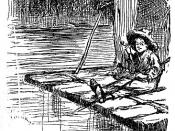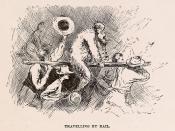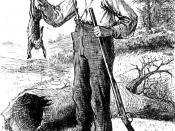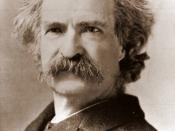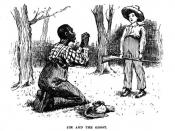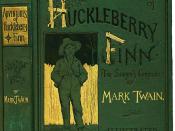Many people knew Mark Twain for his regard of women. However, the culture of his time believed women were inferior to men, and a woman's place was as a housewife. Twain disagreed with many of his society's views, those pertaining to women in particular. In The Adventures of Huckleberry Finn, Twain opposes many of his society's views, including the roles of women. Oftentimes in his novel, Twain's female characters were better than men. In fact, in The Adventures of Huckleberry Finn, Twain uses most women as positive characters, using them as foils to negative male characters in the novel, instilling in each main female character positive virtues, and using the women and their virtues to help Huck mature.
One such woman is the Widow Douglas. Twain uses the Widow Douglas to personify the virtues of love and patience. The widow shows these virtues many times throughout her experiences with Huck, originally by taking Huck into her home.
Then, even though she has no blood ties to Huck, the widow continually puts up with Huck's antics and teaches him to embody her virtues, teaching him to "help other people, and do everything I [he] could for other people, and look out for them all the time" (Twain 8). Also, she constantly and continually refuses to force Huck out of her home, despite his rebellious nature, ignoring her severe, unforgiving sister. Twain also uses the Widow Douglas and her virtues to serve as a literary foil to Huck's paternal father, Pap. Pap has no redeeming qualities; he is simply a drunk, violent man. Many times Pap gets "wonderful fast, kicking things every which way, and striking and grabbing at the air with his hands," especially after he has a few alcoholic drinks (Twain 21). Not only does Pap strike inanimate objects, he also makes a habit of striking his son, Huck. Making the dramatic difference between the Widow Douglas and Pap even more distinct is the fact that Huck goes from one adult to the next and back again with no real transition period in-between. After living with Pap, the widow accepts Huck into her home, and then, after a short time with the widow, Huck comes under the heinous guardianship of his father Pap once again. Despite Pap's negative influence on Huck and the Widow Douglas' relatively short time with him, Huckleberry learns many values from the widow, which start him on his journey to maturity. Among the many things Huck learns and receives from the Widow Douglas are a school education and knowledge about the Bible and Christian beliefs. Although Huck seems ignorant and careless when in reference to much the widow tells him about Christianity, many times in his near future, and throughout his journey, Huck remembers and relies on the same truths the widow imparts to him. In her own way, the Widow Douglas not only embodies several positive virtues and provides a foil character to Huck's evil father, Pap, she also helps Huck mature emotionally and spiritually.
Another woman Twain uses positively in The Adventures of Huckleberry Finn is Mrs. Loftus. Mrs. Loftus is the first woman Huck encounters in contact with, after staging his own death and running away with Jim. In his own youthful foolishness, Huck decides to dress up like a girl and go ashore in order to learn any news of his hometown. The first place he comes to happens to be the Loftus homestead. Mrs. Loftus tells the girl look-alike to come in, sit down and rest. What Huck fails to realize when he tries to dupe Mrs. Loftus into believing he is a girl, is that Twain uses Mrs. Loftus as a symbol of the virtue wisdom. Therefore, because of her wisdom, Mrs. Loftus almost immediately recognizes Huck as a girl and for the fraud he is.
Throughout the whole novel, the only male character who even remotely embodies wisdom is Colonel Sherburn, a murderer who appears at another town down the river. However, because Twain intends Sherburn to be a negative character, and act as a foil to another character in the novel, Colonel Grangerford, no male in the novel has any truly wise characteristics. Therefore, there is no one true foil to Mrs. Loftus's character. Despite her lack of foil character, Mrs. Loftus is an incredible influence on Huck, imparting upon him some of her womanly virtues. Also, she gives Huck some very good advice on passing himself off as a girl, such as "when you set out to thread a needle"æhold the needle still and poke the thread at it"æ. And when you throw at a rat or anything, hitch yourself up a tip-toe, and miss your rat about six or seven foot" (Twain 46). Obviously, despite this good advice from Mrs. Loftus, Huck decides being a girl is too troublesome and complicated. He shows these feelings by avoiding dressing up like a girl again throughout the rest of the novel. Before meeting Mrs. Loftus and encountering her "female principle of virtue," Huck is a realist, but he has no common sense, which he shows by always running around with Tom Sawyer and playing childish and capricious games such as robbers (Bloom 152). As Huck journeys onward down the river and encounters many false people, he deals with those people with more grace and wisdom than most boys in his situation, due to his short but advantageous time with Mrs. Loftus. Twain appropriately uses Mrs. Loftus as a positive character, and although he leaves her with no foil character, he uses her wisdom to help Huck grow and mature.
Another character in the novel, and probably the best influence on Huck, is the fair Mary Jane Wilks. Twain uses Mary Jane "like other women in the novel, to be a significant influence on Huck's developing conscience" (Johnson 180). Mary Jane, in addition to other women in the novel, embodies a positive virtue. The main virtue Mary Jane symbolizes, out of several, is innocence. Mary Jane shows her innocence throughout her role in The Adventures of Huckleberry Finn, mainly in her dealings with the King and the Duke. The very first time Mary Jane meets the false King and Duke, she goes against the wise council of a family friend and entrusts her inheritance to the conmen, saying in complete trust, "Take this six thousand dollars, and invest it for me and my sisters" (Twain 128). This unwise decision becomes the first of several the naÃÂïve Mary Jane makes.
Emphasizing Mary Jane's innocence, and also the worldliness of the King and the Duke, Twain puts the three characters together in this particular part of the story, and makes the three characters literary foils. The King and the Duke are conmen, who go from town to town tricking people into giving away their money. The only reason they meet Mary Jane is because they con the Wilks sisters into believing they are the girls' long lost uncles. Their ability to trick the girls, mainly Mary Jane, shows the Duke and King's faulty, dishonest characters, and Mary Jane's innocence.
The virtues Huck learns from Mary Jane, oddly enough, stem from her innocence, but not directly. Huck is already naÃÂïve; he needs none of her innocence. The virtues he learns from Mary Jane are compassion and a sense of responsibility, and he begins to experience these feelings after seeing the way the King and the Duke treat Mary Jane and the girls. Not only does Huck feel guilty about the con he is a part of because Mary Jane is so attractive, but also she is sweet and a genuinely caring person. All these reasons make Huck resent what the King and the Duke plan to do to her. Huck's resentment shows his compassion for the attractive girl and her sisters. In his resentment and his rush to make up to Mary Jane for all the wrong the King and the Duke cause her, Huck begins to experience a sense of responsibility for the Wilks' welfare. In Huck's taking on these two virtues, plus Mary Jane as a positive female character with literary foil characters, Mary Jane fits Twain's role for women in The Adventures of Huckleberry Finn.
Before going on his journey and meeting all the important women in the novel, Huck is an immature boy, playing robbers all around the countryside. However, as he continues on his journey, meeting all the false men, and then the women "that could redeem society," Huck matures. He matures by acquiring all the positive virtues he sees in women, and freeing himself from the clutches of their evil foils, men.
Works Cited Bloom, Harold. Literature Resource Center. New York: Chelsea House Publishers, 1993.
Harris, Susan K. Huck Finn. New York: Chelsea House Publishers, 1990.
Johnson, Claudia Durst. Understanding Adventures of Huckleberry Finn. New New York: Greenwood Publishing Group, 1996.
Twain, Mark. The Adventures of Huckleberry Finn. New York: Dover Publications Inc, 1994.
